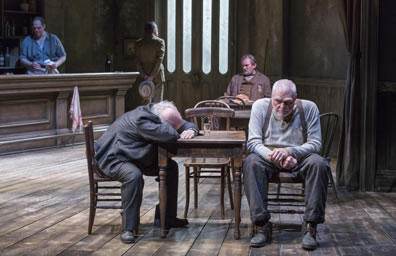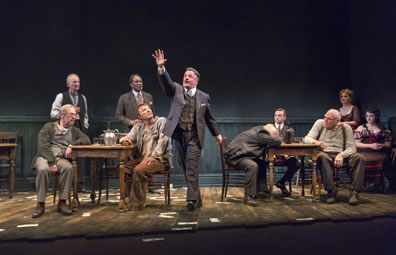The Iceman Cometh
A Long Day's Journey into Night
By Eugene O'Neill
Goodman Theatre, BAM Harvey Theater, Brooklyn, New York
Saturday, March 7, 2015, C–6&7 (right orchestra)
Directed by Robert Falls

Along with other boarders at Harry Hope's saloon, Larry Slade (Brian Dennehy, right) contemplates his past, present, and future in the Goodman Theatre's production of Eugene O'Neill's The Iceman Cometh at BAM. Across from Slade is the sleeping Hugo (Lee WIlkof), behind is Piet (John Judd), the bartender Rocky (Salvatore Inzerillo) and, standing at the door, Cecil (John Reeger). Photo by Richard Termine, BAM.
I might not have the proper perspective to write a review of the Goodman Theatre's fine production of Eugene O'Neill's The Iceman Cometh currently playing at BAM. O'Neill is a giant of American theater, but I have seen only a couple of his plays, and this is my first time seeing The Iceman Cometh. Written in 1939 and set entirely in a bar circa 1912, it comprises 15 characters who spend most of the play in a drunken stupor. Except when I used to cover nightclubs for an arts newspaper, I've never spent much time in bars, and my alcohol intake maxes out at five glasses of wine over a week. The play's moral seems to be an epistle against pipe dreams (pipe dreams appears 39 times in the script); I, on the other hand, am an inveterate pipe dreamer.
However, I do have one perspective regarding this play that counts as expertise: one-half of my journalism career is as an editor, and as an editor, I can say unequivocally that O'Neill needed an editor for The Iceman Cometh. What merits as a dramatic study of the natural anarchy plaguing mankind—on the parallel levels of the society in which the species functions and the psychology of its individual members—is too damned long: four hours and 45 minutes, with three intermissions. By the end, some of the people around me were in stupors, too, which you could argue is simply the medium being the message.
But I argue that the iceman took too much friggin' time to cometh. That's blasphemy, I know; after all, this is classic O'Neill and Goodman Theater and Brian Dennehy and Nathan Lane and an excellent ensemble and exquisite production designers all directed by the sure-handed Robert Falls, Goodman's artistic director and a leading expert on O'Neill. But I'm an expert on editing, and editors are, by nature, blasphemous.
So, come on, pipe dream 39 times? Are you crapping me? Once, twice, three times makes a point, four becomes a hammer, five becomes a two-by-four, six is a sledgehammer: 39 is apocalyptic overuse. I mean, jasperin' criminy, this sucker outlasts Hamlet. Have you ever seen Hamlet played at full length other than Kenneth Branagh's move? Who would dare, right? And Shakespeare's play is the proclaimed greatest piece of literature (and drama) in the history of man. O'Neill's is four hours of drunken, redundant überprofundity spouted (or slurred, depending on the number of sheets blowing in the wind) by the biggest bunch of do-nothing losers not working on Capitol Hill. And yet this ordeal gets a full staging in two cities.
Why? Why the excess of this whole exercise in endurance? O'Neill loved length. His original script of Strange Interlude clocks in at more than five hours, but at least that one covers a lifetime; Iceman is one dadgum day. It's obviously nothing more than showing off, starting with O'Neill. Look at me, I can write a play about a day and make it last two (or seem to). Then come the directors who exalt him as a great American playwright who needs his space to hammer really deep truths into us over and over and over and over and over and over and over and over again to the 39th degree. Got a willing director, especially a good one, you get willing actors (I'm pretty sure Equity contracts have an overtime clause; do they have an O'Neill clause, as well?). With actors like Dennehy and Lane, you get willing audiences. At the end of the show, the audience gives a standing ovation—and the actors applaud back—and it all seems more like self-congratulations—“We made it!”—than appreciation. For the record, when this production first ran at the Goodman in 2012, it set box office records for the company, and we encountered scalpers on our way into BAM's Harvey Theater. WTF?
And, for the record, I will not blasphemy Dennehy. He is such a great actor (his Willy Loman from 1999 is seared into my soul) that though he spends almost the whole play sitting at a table merely staring out into the audience, occasionally downing shots, scratching his arm, and growling his impatient dissatisfaction with life—once or twice raising the timbre to a roar—he remains a riveting force on stage. He plays Larry Slade, a “one-time Syndicalist anarchist” who became dissatisfied with the movement and now drinks his way toward a slow death. Whether he is indulging in the despair of the saloon's clientele, or trying to stave off the extreme optimism of onetime drinking buddy Hickey (Lane), or resisting the reminiscences of the anarchy movement and his long-ago girlfriend (whose son, Don Parritt, played by Patrick Andrews has shown up seeking Slade's counsel), Dennehy plays out Slade's meditations and reactions in varying, subtle shades of expression. His eyes have seen so much but now wish to see nothing at all, and when he drinks or walks to the bar, Dennehy moves as if rigor mortis is already setting into his joints while his posture bears the anvil of Slade's lifetime of bad miscalculations. Slade doesn't have the majority of lines in this ensemble play, but Dennehy keeps him at the center of our attention, even when the whores get into a fight (Kate Arrington's Cora vs. Tara Sissom's Pearl and then Lee Stark's Margie).
When you break down the production to its individual merits, you see much glittering gold—or, rather, the sepia tone atmosphere of a 1912 New York Bowery saloon and rooming house. Kevin Depinet's set (inspired by a set design by John Conklin) is oil-painting gorgeous and grandiloquent in its dinginess, down to the glue-like grime in the floorboard seams and the veneer on the bar and walls that have been weather-beaten and people-scraped to a pre-existing memory. Natasha Katz's lighting complements the set with a pervading dismalness while also capturing the state of the characters' minds, especially juxtaposed to the bright sun outside the saloon's huge doors.
The cast is so strong that one of our longtime favorite actors gets a bit part at the very end speaking a half dozen lines (Andrew Long, playing Moran, a cop). The actors occupy O'Neill's damaged-beyond-repair characters body and soul, from John Hoogenakker's Willie Oban, a Harvard Law School alumnus so overly intoxicated that just an hour without a drink leaves him shaking with the DTs, to Lee Wilkof's Hugo Kalmar, a former editor of anarchist periodicals who spends most of the play head down on a table sleeping. He occasionally wakes to insult whichever “leedle monkey-face” is sitting next to him before falling back asleep with dreams of “trinking vine beneath the villow trees.”
The play's centerpiece occasion is the birthday of Harry Hope (Stephen Ouimette), proprietor of the saloon. All of his boarders, along with bartenders Rocky (Salvatore Inzerillo) and Chuck (Marc Grapey), are waiting for the life to show up for the party, super salesman Theodore Hickman, “Hickey” to his friends, Nathan Lane to us. Beginning with his explosive entrance late in the first act, this most-voluble character continues through the rest of the play in such a loud, over-eager, sales-talk vein that at times Lane visibly wavers—understandable, as O'Neill has him sprinting this entire cumshucking marathon. The erstwhile drunk is now selling redemptive euphoria, thanks to some mysterious life-changing event. He tries to get his friends to emerge from their stupors, abandon their own individual P-word, and tackle a new tomorrow, including Jimmy “Tomorrow” Cameron (James Harms), nicknamed as such because he's always contending he could get his old job back tomorrow, suppressing the fact he was fired in the first place.

Theodore "Hickey" Hickman (Nathan Lane, center) announces his redemption from pipe dreams as his longtime drinking buddies listen—except the sleeping Hugo (Lee Wilkof)—in the Goodman Theatre production of Eugene O'Neill's The Iceman Cometh at BAM. From left, Harry Hope (Stephen Ouimette, sitting), "Jimmy Tomorrow" (James Harms), Joe Mott (John Douglas Thompson), Willie Oban (John Hoogenakker), Don Parritt (Patrick Andrews), Larry (Brian Dennehy), Margie (Lee Stark) and Pearl (Tara Sissom). Photo by Richard Termine, BAM.
Hickey's initial impact, however, is to inadvertently sow dissension as his friends sober up: Cecil Lewis, the old British Infantry captain of the Boar War (John Reeger) and Piet Wetjoen, his onetime Boar commando enemy (John Judd), turn from drinking buddies to hated enemies again. Joe Mott (John Douglas Thompson), the one-time proprietor of a Negro gambling house, suddenly becomes aware of racist persecution among his companions at the same time his white friends seem to suddenly awake to the fact that he's black. Their attempts to leave the bar in search of the tomorrow their previous pasts had promised falter. One by one, they return to Harry Hope's saloon, where Hope himself is convinced Hickey has done something to the booze, too, because he can't get drunk enough.
O'Neill's is a helluva depressing life view. His characters are such damaged goods, usually by their own bad choices, that a drunken stupor is their best state of existence. It takes real death to submerge them again in their delusions and their previous semblance of living. Most damaged and damaging of all is the seeming redemptive force at the play's center. The title refers to Hickey's long-running joke that he should get home to his wife before “the iceman comes” with whom she purportedly is having an affair. She's not: her degree of unconditional love for Hickey is unfathomable and results in the arrival of another type of iceman that makes up the play's second-to-last plot twist. This is all laid out in a soliloquy by Hickey that seems as long as the lifetime he's relating.
And that's the thing. By the time Hickey gets to his crux moment, the people on either side of me were dozing and I was zoning. And still the play had another 15 minutes to go and one more plot strand to untie.
For all the golden pieces of both the play and production, the sum of its parts is an algebraic equation that fills out the whole chalkboard. Jiminy Christmas, it's overwhelming. So, slash one of the plot threads, cut out or combine a couple of characters, trim the long speeches, and kill, kill, kill the redundancies, and you'll get the masterpiece O'Neill has himself buried in so much excrement.
Eric Minton
March 13, 2015
Comment: e-mail editorial@shakespeareances.com
Start a discussion in the Bardroom



 Find additional Shakespeareances
Find additional Shakespeareances